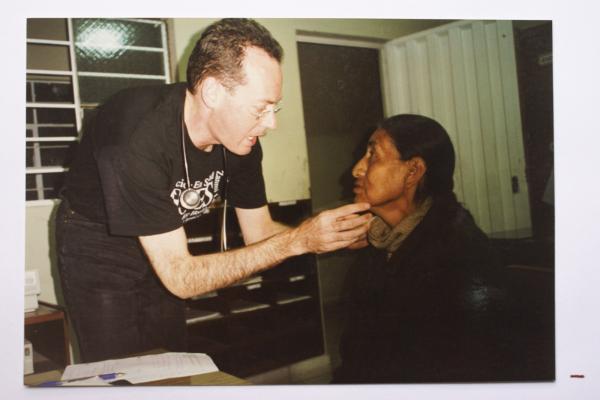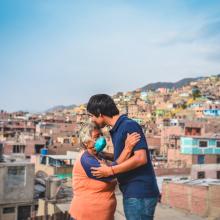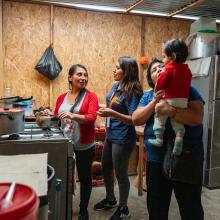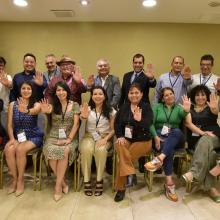Dr. Paul Farmer understood that health could not be reduced to a clinical diagnosis. Fighting health injustice involves more than access to treatment. It requires questioning and transforming the conditions that determine people’s health and broadening the concept of health care to ensure that no one is left out of the right to health.
At Socios En Salud (SES), this vision remains valid. “Illnesses are not only diagnosed with lab tests, or cured with medications. Health is more complex and requires interventions to address economic, sociocultural and health system barriers,” says Helen Marin, head of the Advocacy and Community Outreach Unit.
Economic hardship, lack of knowledge about health services, discrimination, among other factors, prevent many people from receiving adequate care. “From SES, we give voice to the most vulnerable about gaps in care in the health system,” Marin adds. This work allows more people to access the medical care they need.
The accompaniment of communities is not limited to the provision of medical services. SES seeks to generate sustainable changes over time. “To do this, we empower leaders of organizations to advocate for the improvement of the health of their communities,” Marin explains. An effort based on dialogue and joint action with communities, not just for them.
It is work that also involves questioning those who design public policies. “More prepared, leaders can demand from the authorities that all people have access to the best health conditions,” Marin points out. Health justice is not only achieved with medical resources, but also with structural changes driven by the communities themselves.
Community Leadership: The Key to Change
One of Paul Farmer’s principles was that the real experts in the fight for health are those who live inequity every day. At SES, this approach remains fundamental. Community knowledge and organizing skills are key tools for transforming access to health.
“The key players are community leaders and civil society organizations,” says Oscar Ramirez, Project Manager for the Global Fund’s Partners in Health Regional Grant. They are the ones who drive change and make visible the need for solutions adapted to their own reality.
These leaders not only know the needs of their environment, but also confront firsthand the obstacles that hinder access to health. “Through their life experience, in activism and the knowledge they have of the community, they have the strength to push for all the changes that are needed in the health issue,” Ramirez adds.
That is why SES is working to strengthen the role of these key actors. “We seek to strengthen the capacities of these leaders and organizations to bring their voice to spaces of discussion and decision making,” Ramirez explains. Health advocacy is not an isolated effort, but a strategy to promote policies that guarantee equitable access.
Community activism has the power to transform health systems from within. “Advocacy complements SES’s health activities, aimed at strengthening social policies in health and ensuring that commitments under those policies are met,” Ramirez says. Health cannot be detached from human rights.
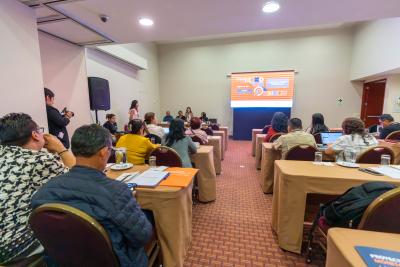
La labor de Socios En Salud busca mejorar el acceso a los servicios de salud, promoviendo el liderazgo comunitario para identificar y responder a las necesidades de cada entorno.
Foto de Diego Díaz / SES
Health Advocacy: Beyond Borders
The fight for health equity does not stop at the local level. Socios En Salud works in decision-making spaces to influence fairer health policies and ensure that care strategies are not only effective, but also sustainable over time and focused on the most vulnerable populations.
This comprehensive approach makes it possible to make visible and address issues such as stigma, discrimination and gender inequality. “The approach to health is taken in a comprehensive manner, so in addition to looking at the issue of health care, other issues such as key populations, stigma and discrimination, gender, human rights are seen,” Ramirez explains.
Social exclusion, economic barriers and lack of political representation affect the health of millions of people. “By identifying the large gaps that still exist around this population, a much greater analysis can be made to have more focused proposals on the actions that are needed to overcome these existing gaps,” Ramirez says.
Participation in decision-making spaces allows Socios En Salud to amplify the impact of its interventions. “Advocacy’s reach is not only at the national level. Currently, we participate in 12 countries in the Latin America and Caribbean region,” says Ramirez. In this way, SES works to improve health systems in different contexts.
Paul Farmer’s commitment to global health continues to inspire Socios En Salud to seek innovative and just solutions. “We open spaces to reach out to other countries around the world, bring all the knowledge and keep saving more and more lives,” Ramirez says. His legacy lives on in every community he manages to transform.
If you would like to receive more information about our activities, subscribe here. Join our movement for health!
